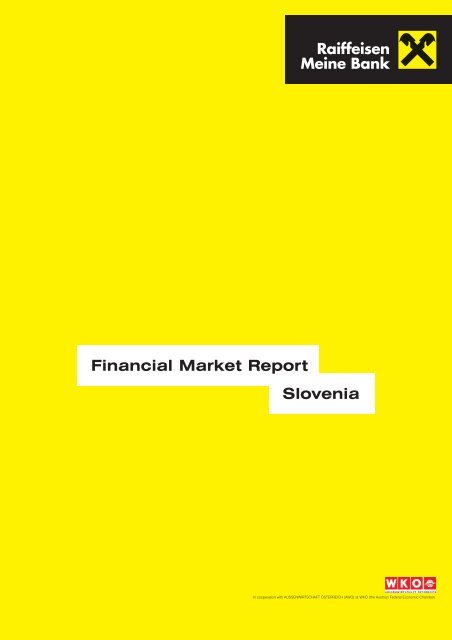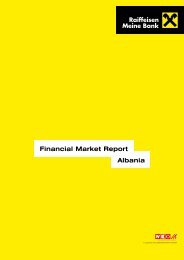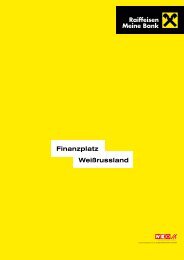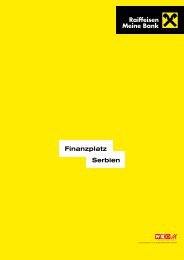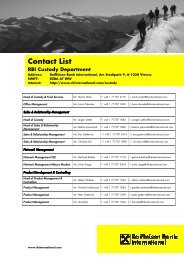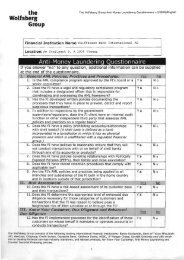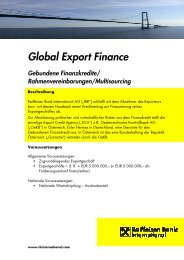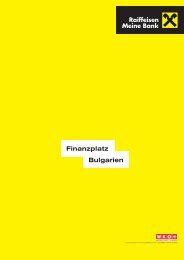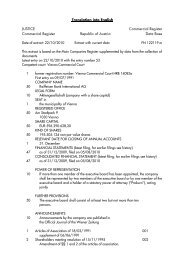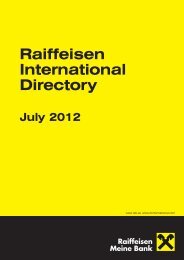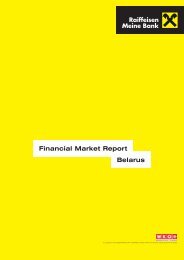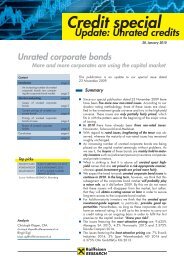Slovenia eng 2012 a:Slovenia-II a - Raiffeisen Bank International AG
Slovenia eng 2012 a:Slovenia-II a - Raiffeisen Bank International AG
Slovenia eng 2012 a:Slovenia-II a - Raiffeisen Bank International AG
You also want an ePaper? Increase the reach of your titles
YUMPU automatically turns print PDFs into web optimized ePapers that Google loves.
Financial Market Report<br />
<strong>Slovenia</strong><br />
In cooperation with AUSSENWIRTSCHAFT ÖSTERREICH (AWO) at WKÖ (the Austrian Federal Economic Chamber)
Country Profile: <strong>Slovenia</strong><br />
<strong>Raiffeisen</strong> Research. As in August 2011.<br />
Currency: Euro*<br />
Gross Domestic Product and Budget 2009 2010 2011e <strong>2012</strong>f<br />
Real GDP growth, % p.a. –8.1 1.2 2.0 2.0<br />
Nominal GDP, €bn 35.4 36.6 38.3 40.0<br />
Per capita GDP, PPP basis, € 20,800 21,200 21,700 22,000<br />
Growth in industrial output, % p.a. –17.3 6.7 4.0 4.0<br />
Consolidated budget surplus, % of GDP 9.2 –6.0 –5.5 –5.0<br />
Inflation and Employment<br />
Jobless rate, annual average, % 9.2 10.7 11.5 11.0<br />
Average monthly gross wage, € 1,419 1,483 1,557 1,635<br />
Consumer price inflation, annual average, % p.a. 0.9 1.8 2.0 2.2<br />
Balance of Trade and Current Account<br />
Goods exports, €bn 1.2 18.4 20.6 23.3<br />
Goods imports, €bn 16.9 19.3 21.5 24.1<br />
Current account deficit, €bn –0.5 –0.4 –0.6 –0.7<br />
Current account deficit, % of GDP –1.5 –1.1 –1.6 –1.8<br />
Foreign debt, % of GDP 113.8 111.7 108.0 104.9<br />
Rates of Exchange and Interest Rates<br />
Local currency/US$ (average) * * * *<br />
3-month money market rate (EURIBOR), average, % 1.2 0.8 1.4 1.8<br />
Country Ratings<br />
S&P AA<br />
Moody's Aa2<br />
Fitch AA<br />
*Euro introducing at January 1 st 2007<br />
2
The <strong>Slovenia</strong>n Financial Market<br />
Important:<br />
1. The Economic and Political Situation in <strong>Slovenia</strong> . . . . . . . . . . . . . . . . . . . . . . . . . . . . . . . . . . . . . . . . . 4<br />
2. Company Law . . . . . . . . . . . . . . . . . . . . . . . . . . . . . . . . . . . . . . . . . . . . . . . . . . . . . . . . . . . . . . . . . . . . 5<br />
3. Accounting . . . . . . . . . . . . . . . . . . . . . . . . . . . . . . . . . . . . . . . . . . . . . . . . . . . . . . . . . . . . . . . . . . . . . . . 9<br />
4. Taxes and Legislation . . . . . . . . . . . . . . . . . . . . . . . . . . . . . . . . . . . . . . . . . . . . . . . . . . . . . . . . . . . . . . 10<br />
5. Privatization . . . . . . . . . . . . . . . . . . . . . . . . . . . . . . . . . . . . . . . . . . . . . . . . . . . . . . . . . . . . . . . . . . . . . 13<br />
6. Arbitration . . . . . . . . . . . . . . . . . . . . . . . . . . . . . . . . . . . . . . . . . . . . . . . . . . . . . . . . . . . . . . . . . . . . . . . 14<br />
7. Support and Subsidies . . . . . . . . . . . . . . . . . . . . . . . . . . . . . . . . . . . . . . . . . . . . . . . . . . . . . . . . . . . . . 15<br />
8. Risk Mitigation and Finance . . . . . . . . . . . . . . . . . . . . . . . . . . . . . . . . . . . . . . . . . . . . . . . . . . . . . . . . . 18<br />
9. Payment and Account Services at <strong>Raiffeisen</strong> <strong>Bank</strong>a d.d. . . . . . . . . . . . . . . . . . . . . . . . . . . . . . . . . . . 23<br />
10. <strong>Raiffeisen</strong> <strong>Bank</strong>a d.d. . . . . . . . . . . . . . . . . . . . . . . . . . . . . . . . . . . . . . . . . . . . . . . . . . . . . . . . . . . . . . . 27<br />
11. Your <strong>International</strong> Business Specialists at <strong>Raiffeisen</strong> <strong>Bank</strong>a d.d.<br />
and the Global <strong>Raiffeisen</strong> Network . . . . . . . . . . . . . . . . . . . . . . . . . . . . . . . . . . . . . . . . . . . . . . . . . . . 28<br />
Despite thorough research and the use of reliable sources, we cannot accept responsibility or liability for the completeness<br />
or accuracy of this brochure’s contents. The purpose of this brochure is to give you initial, general information<br />
to help you develop business relationships in <strong>Slovenia</strong>. The content of this brochure does not constitute<br />
any form of advice or offer or invitation to make an offer.<br />
Prepared in cooperation with AUSSENWIRTSCHAFT ÖSTERREICH (AWO) at WKÖ (the Austrian Federal<br />
Economic Chamber).<br />
Sources:<br />
<strong>Raiffeisen</strong> <strong>Bank</strong> <strong>International</strong> <strong>AG</strong><br />
WKO: AWO <strong>Slovenia</strong> Country Report; AWO Special Reports: Setting up a Company and Taxes in <strong>Slovenia</strong>,<br />
Property and Receivables in <strong>Slovenia</strong>.<br />
Copy deadline: September 2011.<br />
3
1. The Economic and Political<br />
Situation in <strong>Slovenia</strong><br />
4<br />
The last parliamentary elections took place in autumn of 2008, and since then the Social Democrats, whose<br />
chairman is <strong>Slovenia</strong>n Minister President Borut Pahor, have led the way forward. President Danilo Türk, who<br />
was elected in November 2007, doesn’t have major governmental powers, but he must be viewed as a<br />
significant authority. <strong>Slovenia</strong> has been part of the European Union since 2004, and they have had the euro<br />
since January 2007. In the first half of 2008, <strong>Slovenia</strong> was the first new EU member to take over the EU<br />
council presidency, and <strong>Slovenia</strong> has been a member of the OECD since 21 July 2010.<br />
<strong>Slovenia</strong> had revised economic growth of 2.3% p.a. in the first quarter 2011, which was significantly stronger<br />
than the second quarter with its disappointing 0.9% p.a. We believe that total GDP for 2011 will grow by<br />
about 2.0%. We are also expecting about 2.0% economic growth in <strong>2012</strong>, with exports continuing to be the<br />
primary driver of growth. <strong>Slovenia</strong>’s most important trade partners are Germany, Italy and Croatia. While<br />
exports have driven growth forward, domestic demand continues to remain weak. High unemployment and<br />
continuing low consumer spending may also cause slow recovery of domestic demand. <strong>Slovenia</strong>’s dependency<br />
on the aforementioned export countries will therefore remain high.<br />
The budget came under serious pressure during the financial crisis, with the deficit climbing from 0.3% of<br />
GDP in 2008 to 6.0% of GDP in 2010. We anticipate a slight deficit reduction in 2011 down to 5.5% of GDP.<br />
The government wants to reduce the budget deficit to 3.0% of GDP by the end of 2013, thereby reaching<br />
the Maastricht targets. Under the current conditions, including the economic slowdown in the euro zone, we<br />
view this goal as unrealistic without further savings measures. We expect the deficit to stand at 4.5% of GDP<br />
by 2013. The banking sector, of which about 44% is currently under state control, may make budget<br />
consolidation more difficult. Moody’s lowered the ratings for <strong>Slovenia</strong>’s three largest banks in June due<br />
largely to the financing requirements for the banking sector.<br />
The <strong>Slovenia</strong>n government’s attempt to introduce a few reforms led to a referendum in which the population<br />
rejected these steps. This included a pension reform in June that would have raised the pensionable<br />
age. The government wanted to do this to secure long-term financing for public finances. The ruling<br />
coalition lost their majority at the beginning of May 2011 when a coalition partner, the Democratic<br />
Pensioners Party (DeSUS), left the government over disagreements about pension reform. The government<br />
also lost their second coalition partner, the Zares, in June 2011 due to several differences of opinion, including<br />
bringing forward new elections. Without Zares and DeSUS, Pahor’s government only has 33 of 90<br />
parliamentary seats. Meanwhile, the government continues working on a law that would limit public expenditure.<br />
There are plans to reduce the size of ministries, as well as massive funding and wage cuts for<br />
public servants. The current political constellation, however, may make such plans extremely difficult to<br />
realise. <strong>Slovenia</strong>’s current negative ratings reflect this uncertainty.
2. Company Law<br />
2.1. Legislative foundations<br />
The <strong>Slovenia</strong>n business enterprises act recognizes the following forms of foreign investment: creation of a<br />
branch; formation of an enterprise that is wholly foreign owned (subsidiary); 100 per cent takeover of an<br />
existing enterprise; acquisition of a stake in an existing enterprise (the foreign stake or foreign share of the<br />
votes must be at least 10 per cent and the foreigner(s) must be able to exert a significant influence on the<br />
enterprise’s management); formation of an equity joint venture with a <strong>Slovenia</strong>n partner (the foreign stake<br />
or foreign share of the votes must be at least 10 per cent and the foreigner(s) must be able to exert a significant<br />
influence on the enterprise’s management). Besides legal entities (business enterprises, cooperatives,<br />
local authorities), <strong>Slovenia</strong>n investment partners can also be individuals. Under <strong>Slovenia</strong>n competition<br />
law, corporate mergers (business concentration) of enterprises whose joint annual revenues in the<br />
<strong>Slovenia</strong>n market in the two preceding financial years, without tax, came to more than €33 million or whose<br />
joint market share exceeds 40 per cent must be reported to the office of fair trading. In addition, the provisions<br />
of the takeovers act must be observed.<br />
2.2. Setting up a branch<br />
<strong>Slovenia</strong>’s business enterprises act distinguishes between foreign enterprises domiciled inside and outside<br />
the EU. Enterprises domiciled in EU Member States can operate in <strong>Slovenia</strong> either directly or, if the business<br />
activity is a continuous one, through a <strong>Slovenia</strong>n branch or subsidiary. A branch acts in the name and<br />
for the account of the foreign enterprise (its “parent”) and must use the name and registered address of<br />
the parent. It can operate for profit and act as an importer within the meaning of the customs act. The foreign<br />
parent is liable for the branch’s obligations in <strong>Slovenia</strong> with all its assets. A foreign enterprise domiciled<br />
in the EU or European Economic Area can immediately set up a branch in <strong>Slovenia</strong>, whereas enterprises<br />
domiciled in non-member countries must already have been registered in the companies register in<br />
their country of domicile for at least two years. The branch must must be registered with the locally competent<br />
registry court. The application must be made by the branch’s representative. The head of the<br />
branch does not have to be a <strong>Slovenia</strong>n national or resident in <strong>Slovenia</strong>. Once the ruling on registration in<br />
the companies register has been received, the branch must be registered with the Agency of the Republic<br />
of <strong>Slovenia</strong> for Public Legal Records and Related Services (AJPES), stating the object of the enterprise in<br />
accordance with the standard <strong>Slovenia</strong>n classification of activities. Finally, the branch must open a transaction<br />
account at one of the banks authorized to execute payments. Foreign investors rarely opt for the<br />
branch as a legal form because it does not have any tax advantages over a subsidiary. If annual financial<br />
statements have been prepared in accordance with EU standards, they must be submitted. Otherwise,<br />
separate annual financial statements must be prepared for the branch. An investor is only advised to opt<br />
for legal form of a branch if that investor does not want to have to raise the minimum capital stock required<br />
to form a limited liability company.<br />
5
2.3. Setting up a subsidiary<br />
6<br />
A wholly owned subsidiary of a foreign enterprise without any <strong>Slovenia</strong>n shareholders or partners is a superior<br />
form of direct investment.<br />
Company law<br />
Essentially, <strong>Slovenia</strong>n company law recognizes the same forms of enterprise as Austrian law. Apart from<br />
self-employed sole proprietors and silent partnerships, all companies (including partnerships) are legal<br />
entities that can own movable and immovable assets, acquire rights and obligations and sue and be sued.<br />
In general, one can opt for any legal form. The legal form of joint-stock company is only mandatory for certain<br />
activities (e.g. banking and insurance). <strong>Slovenia</strong> does not have business supervision law<br />
(Gewerberecht) in the Austrian sense. Generally, the principle is that a company can only carry on the activities<br />
that it has registered in the companies register, so it is necessary already to have any planned activities<br />
listed in detail in the memorandum and articles of association. On the other hand, <strong>Slovenia</strong> does have<br />
a large number of regulated professions (from salesperson to doctor or lawyer) that require special training<br />
or for which one must at least furnish proof of a certain period of appropriate practical experience. One<br />
can acquire the qualification needed to carry on a regulated profession in <strong>Slovenia</strong>, and foreign proofs of<br />
qualifications can be accredited in <strong>Slovenia</strong> within the scope of a special procedure for accrediting professional<br />
qualifications at the <strong>Slovenia</strong>n Ministry of Labour, Family and Social Affairs. During the procedure,<br />
other proofs such as proof that one has a command of the <strong>Slovenia</strong>n language may be required. If the<br />
activities is a craft or similar activity within the meaning of the <strong>Slovenia</strong>n craft industries act, the right to carry<br />
on the activity will be acquired upon registration in the crafts register kept by the <strong>Slovenia</strong>n Chamber of<br />
Craft Industries.<br />
Self-employed sole proprietor<br />
A self-employed sole proprietor (<strong>Slovenia</strong>n: Samostojni podjetnik, abbreviated as s.p.), who is liable with all<br />
of his or her assets, can commence an activity once following registration with AJPES.<br />
One can also register electronically (http://evem.gov.si/sp), but registration must take place in <strong>Slovenia</strong>n.<br />
Sole proprietors can do single-entry bookkeeping so long as they meet the following criteria:<br />
• no more than three employees;<br />
• annual revenues not exceeding €42,000;<br />
• assets not exceeding €25,000.
A self-employed sole proprietor must also open a separate transaction account at a bank and have a stamp<br />
made. If the sole proprietor wishes to have social insurance as a self-employed person, he or she must<br />
register with the pension insurance authority within eight days. EU citizens do not need a work permit.<br />
Partnerships<br />
d.n.o.<br />
The unlimited liability company (<strong>Slovenia</strong>n: Druzˇba z neomejeno odgovornostjo, abbreviated as d.n.o.) is<br />
comparable to an Offene Handelsgesellschaft in Austria. It is formed by way of an agreement between the<br />
partners (memorandum and articles of association). They are liable for the partnership’s obligations and,<br />
in the second degree, with all their personal assets. Insofar as the memorandum and articles of association<br />
do not specify otherwise, every partner is entitled and obliged to manage the partnership and represent<br />
it externally.<br />
k.d.<br />
The limited partnership (<strong>Slovenia</strong>n: Komanditna druzˇba, abbreviated as k.d.) is a partnership in which one<br />
partner is liable with all of his/her/its assets (the general partner) but at least one other partner (limited partner)<br />
is not liable. The limited partner is not entitled to manage the partnership of represent it externally.<br />
Silent partnership<br />
A silent partnership (<strong>Slovenia</strong>n: Tiha druzˇba, abbreviated as t.d.) does not have external relationships. A<br />
silent partners’ contribution merely entitles that partner to a share of profit.<br />
Corporations<br />
Limited liability company<br />
A limited liability company (<strong>Slovenia</strong>n: druzˇba z omejeno odgovornostjo, abbreviated as d.o.o.) is liable for<br />
its obligations with all its assets but the partners in that company are only liable up to the amount they have<br />
subscribed to its capital stock. Without the express permission of the <strong>Slovenia</strong>n Ministry of Economic<br />
Affairs, a limited liability company is not allowed to have more than 50 partners. A “one-man” company is<br />
legally permissible. A limited liability company must have capital stock of at least €7,500, and each capital<br />
contribution must be at least €50. Partners holding a total of at least 10 per cent of the capital stock<br />
have the right to call a shareholders’ meeting. One or more managers or directors must be appointed as<br />
a managing body. A supervisory board is not mandatory.<br />
7
8<br />
Joint-stock company<br />
A joint-stock company (<strong>Slovenia</strong>n: delnizˇka druzˇba, abbreviated as d.d.) is only liable to creditors for its obligations<br />
with its own assets; the shareholders are not liable to its creditors for its obligations. A joint-stock<br />
company can be formed by one or more individuals or legal entities by adopting a memorandum and articles<br />
of association (in the form of a notarial deed). When forming a “one-man” joint-stock company, the<br />
shares must be paid up in full before the company is registered. The company must have capital stock of<br />
at least €25,000. The minimum par value of one share is €1. The joint-stock company can be run on a single-tier<br />
basis (by a board of directors) or two-tier basis (by a managing board and supervisory board).<br />
European company<br />
The act now also recognizes the “European company” (<strong>Slovenia</strong>n: evropska delnizˇka druzˇba, abbreviated<br />
as SE) formed and run in accordance with Council Regulation (EC) No. 2157/2001. A partnership limited<br />
by shares (<strong>Slovenia</strong>n: komanditna delnizˇka druzˇba, abbreviated as k.d.d.) is essentially a limited partnership<br />
whose limited partnership capital takes the form of shares.<br />
Business lobby group<br />
<strong>Slovenia</strong>n law also recognizes business lobby groups (<strong>Slovenia</strong>n: gospodarsko interesno zdruzˇenje, abbreviated<br />
as GIZ; the activity of such a business lobby group must be connected with a business activity of its<br />
members and should only play an auxiliary role in relation to that activity), which are regulated in the business<br />
enterprises act, and cooperatives (<strong>Slovenia</strong>n: zadruga), which are regulated in the cooperatives act.<br />
Associations (an unlimited liability company; <strong>Slovenia</strong>n: druzˇba s polno odgovornostjo, abbreviated as p.o.)<br />
are now very rare.<br />
Companies acquire legal personality by being registered in the companies register. A company can set up<br />
branches, but these too must be registered in the companies register. The company’s name must be in<br />
<strong>Slovenia</strong>n and must express its object and legal form. A company must be clearly distinguishable from<br />
other companies that are already registered.
3. Accounting<br />
<strong>Slovenia</strong>n financial reporting standards are based on the <strong>International</strong> Accounting Standards (IASs) and the<br />
corresponding EU directives. The business enterprises act contains provisions that require all the legal<br />
forms regulated in the act, in varying degrees, to apply these financial reporting standards when preparing<br />
their annual financial statements and keeping their books. Annual financial statements must be prepared<br />
and submitted to the tax authorities within three months of the end of a financial year. Any difference<br />
between a company’s financial year and the calendar year must be reported to the tax authorities. Mediumsized<br />
and large corporations must have their annual financial statements certified by an independent auditor<br />
within six months of the end of the financial year. The managing board must submit the (revised) annual<br />
financial statements and auditor’s opinion to the competent body within eight days. The annual financial<br />
statements of an enterprise whose accounts are subject to a statutory audit must be published within eight<br />
months of the end of the financial year. The annual financial statements of other enterprises must be published<br />
within three months of the end of the financial year. Simple bookkeeping (cash basis of accounting)<br />
is restricted to sole proprietors who do not exceed the following:<br />
• average assets of €25,000;<br />
• annual revenues of less than €42,000;<br />
• an average of three employees.<br />
If they exceed these criteria, they must do double-entry bookkeeping. Subsidiaries of foreign companies<br />
are also subject to the same requirements and bookkeeping obligations.<br />
Records must be kept for 10 years with the exception of records relating to real estate, which must be kept<br />
for 20 years. Ledgers, balance sheets and annual financial statements must be kept indefinitely. The books<br />
must be kept in <strong>Slovenia</strong>n.<br />
9
4. Taxes and Legislation<br />
4.1. Income tax<br />
10<br />
(Zakon o dohodnini; official gazette of the Republic of <strong>Slovenia</strong>, Nos. 117/2006, 10/2008, 78/2008).<br />
Individuals resident in the Republic of <strong>Slovenia</strong> and individuals who are in <strong>Slovenia</strong> continuously for at least<br />
six months and derive income in <strong>Slovenia</strong> have unrestricted tax liability (residents). All other individuals who<br />
derive income in <strong>Slovenia</strong> have limited tax liability (non-residents). Income tax is progressive, with rates of<br />
16, 27 and 41 per cent (the latter from annual income of €14,820.83). Tax thresholds are adjusted for each<br />
assessment year. Various allowances and deductions reduce the tax liability. Given the level of income in<br />
<strong>Slovenia</strong>, the top rate is quickly reached compared with Western European countries.<br />
4.2. Corporation tax<br />
(Zakon o davku od dohodkov pravnih oseb; official gazette of the Republic of <strong>Slovenia</strong>, Nos. 117/2006,<br />
90/2007, 56/2008, 76/2008, 92/2008, 5/2009). All legal entities carrying on an activity for profit on the territory<br />
of the Republic of <strong>Slovenia</strong> have either unrestricted or limited tax liability (therefore including cooperatives<br />
as well as corporations and partnerships). Corporations domiciled in <strong>Slovenia</strong> have unrestricted tax<br />
liability. Corporations domiciled abroad have limited tax liability in <strong>Slovenia</strong> if they derive profits from a permanent<br />
establishment or permanent representative on the territory of the Republic of <strong>Slovenia</strong>. The corporation<br />
tax rate is gradually being lowered. It is 21 per cent in 2009 and will be 20 per cent from 2010.<br />
Dividends distributed to foreign companies are generally subject to a withholding tax at a rate of 15 per cent.<br />
However, withholding tax will not be charged on dividends and similar income or on income from proprietary<br />
rights if they are derived from subsidiaries in a number of EU Member States that apply the common<br />
tax system. However, hidden profit distributions and realized hidden reserves will be taxed when a company<br />
is liquidated. The new corporation tax act includes tax allowances for investments in research and<br />
development (20 per cent) and regional abatements for investments in research and development (30 to 40<br />
per cent), for employing disabled people and apprentices, for voluntary supplementary pension insurance<br />
contributions and for donations. In addition, the act provides for tax relief for investments in production plant<br />
and intangible non-current assets (30 per cent of the invested amount up to a maximum of €30,000).
4.3. VAT<br />
(Official gazette of the Republic of <strong>Slovenia</strong>, No. 117/06). The standard VAT rate is 20 per cent. The reduced<br />
rate is 8.5 per cent, applied, among others, to the following goods and services: food, animal feed, seeds<br />
and fertilizer, water, drugs, medical aids, public transport, books and periodicals, various artistic, cultural,<br />
sporting and literary events, accommodation in hotels and similar accommodation, the use of sporting facilities<br />
and undertakers’ services.<br />
VAT registration is compulsory in the following cases:<br />
• A taxpayer is resident in <strong>Slovenia</strong> or has a permanent establishment there from which he/she/it renders<br />
services or supplies goods (and is likely, in the respective financial year, to record revenue of more than<br />
€25,000).<br />
• A foreign taxpayer makes taxable supplies (supplies of goods and services) in <strong>Slovenia</strong> to customers or<br />
other taxable <strong>Slovenia</strong>n individuals, legal entities or other recipients unless said taxpayer only makes supplies<br />
in respect of which the recipient is taxable.<br />
• A taxpayer in another EU Member State sends supplies to private individuals in <strong>Slovenia</strong>.<br />
There are three possible scenarios in which a foreign taxpayer must be VAT registered:<br />
• A foreign taxpayer carries on a business activity in <strong>Slovenia</strong> via his/her/its branch or as a branch.<br />
• A foreigner carries on a business activity in <strong>Slovenia</strong> and appoints a tax representative.<br />
• A foreigner carries on a business activity in <strong>Slovenia</strong> and has neither a branch nor a tax representative.<br />
Registration in the tax register must take place at the locally competent inland revenue office before the foreigner<br />
commences the activity. If the foreigner does not apply for a VAT number, the recipient of goods and<br />
services must pay the VAT. The VAT number (identifikacijska Sˇtevilka za DDV, abbreviated as IS) is the taxpayer’s<br />
tax reference number preceded by the country code SI.<br />
4.4. Excise<br />
• Excise act (official gazette of the Republic of <strong>Slovenia</strong>, No. 2/2007);<br />
• Excise act implementing regulation (official gazette of the Republic of <strong>Slovenia</strong>,<br />
Nos. 141/2006, 52/2007, 120/2007, 21/2008, 123/2008).<br />
11
12<br />
The following are liable for excise duty:<br />
• manufactures of consumer goods;<br />
• authorized recipients of goods that are liable for excise duty from another Member State;<br />
• importers of goods that are liable for excise duty;<br />
• individuals and legal entities <strong>eng</strong>aging in wholesale trade in goods that are liable for excise duty.<br />
In addition, tax representatives, the senders of goods sent from within the European Union or the recipients<br />
thereof (if this is the more practical solution under the circumstances) are also liable for excise duty. Excise<br />
duty is charged on the following products:<br />
• alcohol and alcoholic beverages;<br />
• tobacco products;<br />
• energy sources and electricity.<br />
Those carrying on an activity that is liable for excise duty or receiving goods that are liable for excise duty<br />
from within the European Union or sending them there must report this fact to the competent customs office<br />
(contact addresses are provided at http://www.carina.gov.si/si/kontakt) in <strong>Slovenia</strong>n at least 15 days before<br />
the goods are dispatched or received or the activity commences. The minister of finance can lay down simplified<br />
procedures for regular consignments or unusual cases.<br />
4.5. Double tax agreement between <strong>Slovenia</strong> and<br />
Austria<br />
A double tax agreement with Austria entered into force on 1 February 1999. The agreement is valid for individuals<br />
and legal entities resident in Austrian and/or <strong>Slovenia</strong>. The residence of an individual in one of the<br />
two countries will depend on their home address, permanent abode, centre of vital interests, usual place of<br />
abode and nationality. If a legal entity is domiciled in both contracting states, it will be considered to be<br />
domiciled solely in the country where it has its place of management. The principal taxes covered by the<br />
agreement are income, PAYE and corporation tax.
5. Privatization<br />
There are no transitional periods for buying land and other real estate. Consequently, EU citizens can buy<br />
real estate under the same conditions as <strong>Slovenia</strong>ns. However, property prices are very high, especially on<br />
the <strong>Slovenia</strong>n coast, so demand is limited.<br />
13
6. Arbitration<br />
14<br />
<strong>Slovenia</strong> has ratified the Convention on the Recognition and Enforcement of Foreign Arbitral Awards (the<br />
New York Convention). In it, the contracting states undertake to recognize and enforce arbitral awards<br />
made in another contracting state.<br />
Consequently, the jurisdiction of the <strong>International</strong> Chamber of Commerce (ICC) or another arbitrator can be<br />
agreed in a contract concluded with a foreign party. The <strong>International</strong> Chamber of Commerce is a globally<br />
represented organization based in Paris.<br />
The arbitration clause of the <strong>International</strong> Chamber of Commerce (ICC) reads as follows: “All disputes arising<br />
out of or in connection with the present contract shall be finally settled under the Rules of Arbitration of<br />
the <strong>International</strong> Chamber of Commerce by one or more arbitrators appointed in accordance with the said<br />
Rules.”<br />
This arbitration clause is also available in many other languages.<br />
Useful agreements to supplement the arbitration clause:<br />
• The number of arbitrators shall be .......................... (one or three).<br />
• The applicable law shall be .............................<br />
• The language used in arbitration proceedings shall be ......................................
7. Support and Subsidies<br />
The EU Cohesion Policy (2007 – 2013)<br />
Point of Departure and Status Quo<br />
There are considerable economic and social disparities between the different regions of Europe, and this is<br />
particularly true in Central and Southeastern Europe.<br />
The EU has set itself three policy objectives to create a balance within these regions:<br />
Objective Priorities<br />
Convergence Support for development and restructuring in the less developed regions<br />
(formerly Objective 1)<br />
Regional Promotion of innovation and sustainable development, support for<br />
competitiveness and the adaptation and modernization of education, training and<br />
employment employment policies<br />
European Str<strong>eng</strong>thening of cross-border, transnational and interregional<br />
territorial cooperation (formerly INTERREG)<br />
cooperation<br />
Source: Enterprise Europe Network.<br />
In order to realize these policy objectives, the European Union has allocated structural funds (European<br />
Regional Development Fund [ERDF], European Social Fund [ESF] and European Cohesion Fund)) in the<br />
amount of €347.4 billion. This EU aid consists of non-repayable grants.<br />
70<br />
60<br />
50<br />
40<br />
30<br />
20<br />
20<br />
0<br />
Poland<br />
Czech Rep.<br />
Breakdown of EU Fund Allocations by Country, 2007 – 2013 (€bn)<br />
Hungary<br />
Romania<br />
Slovakia<br />
Lithuania<br />
Bulgaria<br />
Latvia<br />
<strong>Slovenia</strong><br />
Estonia<br />
15
16<br />
Structure of the Support Programmes: From EU Objective to National Promotional Programme<br />
The individual EU Member States define their national and regional priorities on the basis of the EU objectives<br />
named above and derive individual operational support programmes (OPs) from them. The OPs are<br />
structured according to region and theme. Support focuses (so-called priority axes) regulated by guidelines<br />
approved by Brussels are defined within these programmes. The following themes are deemed to be the<br />
principal focuses for the individual countries: innovation, research and development, creating jobs, environmental<br />
protection, training, SMEs, transportation and regional support.<br />
Special national funding agencies (ministries and investment agencies) are responsible for distributing promotional<br />
funds. While support can be continuously applied for in Austria within the scope of framework programmes,<br />
in Eastern Europe it is granted within the scope of “calls” (tender invitations). Calls for each of<br />
the focuses of support named above take place once or twice a year, and they are open for between one<br />
and three months. The principal criteria of assessment for the granting of support to companies are the size<br />
of a company, its location and the nature of the project to be supported.<br />
How can your company apply for support?<br />
One can submit applications for clearly defined projects while calls are open. Applications will only be<br />
accepted if they are complete (project description, approvals, budgeting, …) and in the language of the<br />
country concerned. Projects that have been submitted are then assessed by evaluators using a points system<br />
in accordance with the guidelines that have been stipulated or laid down in the programme. All the projects<br />
in a call compete with one another. Only those with the largest number of points will be shortlisted for<br />
support.<br />
Timescale of a project receiving support:<br />
2 Wks 2 – 3 Wks 6 – 8 Wks<br />
45 days 45 days 30 days 30 days 6 months<br />
( ) ( ) ( ) ( ) ( ) ( ) ( ) ( )<br />
Example: Application & Processing for an Innovative Investment<br />
Problem +<br />
Analysis<br />
><br />
1st Project<br />
Description<br />
><br />
Clarification of<br />
Legal Details+<br />
Documentation<br />
><br />
Preparation of<br />
Detailed<br />
Application +<br />
All Enclosures<br />
><br />
Submission of<br />
Application<br />
➛ Deadline!<br />
Formal Audit<br />
Examination of<br />
Content<br />
+ Evaluation<br />
A complex and time-consuming process takes place between the time of the application and any disbursement<br />
of funds. One needs experience dealing with pubic authorities and the targets they set.<br />
><br />
><br />
Support Agreement<br />
><br />
Payment of<br />
1st Instalment<br />
Start Approx. Approx. Approx. Approx.<br />
3 months 6 months 7 months 8 months<br />
><br />
Interim Report +<br />
Interim<br />
Settlement
National Subsidies<br />
In addition to the EU structural funds, companies can also apply for support from national funds. To be worthy<br />
of support, it is very important for an investment project to be of economic importance to the country or<br />
region. The criteria of assessment are the minimum size of the investment, the number of jobs it will create<br />
and the minimum period those jobs will continue to exist.<br />
The following investment incentives are possible:<br />
• tax reductions, tax deferrals and tax exemptions;<br />
• grants;<br />
•loans;<br />
• guarantees;<br />
• equity investments;<br />
• cheaper land.<br />
However, these incentives are subject to the national regulations applicable in the particular country (special<br />
economic zones, investment certificates, ...) and must be applied for to regional funding bodies.<br />
Please note:<br />
• An application for support must be made before the project begins.<br />
• The guidelines for support must be mirrored in the project description.<br />
• Details of the guidelines may change during a call, so one must always keep up to date with them.<br />
• Investment plans must never depend on support. A project must also be viable without support.<br />
• There is no legal right to support.<br />
For more information, go to http://www.ri.co.at/index.php?id=307&L=1 or contact our support and subsidy<br />
experts.<br />
17
8. Risk Mitigation and Finance<br />
Guarding against investment risks abroad<br />
18<br />
aws (Austria Wirtschafts Service GmbH = the federal government’s funding agency)<br />
aws provides guarantees to protect Austrian companies against financial risks arising from their equity<br />
investments abroad within the scope of Ost-West-Fonds (East-West Fund) guarantees.<br />
Two kinds of protection are available, the direct guarantee and the finance guarantee (with or without risk<br />
sharing).<br />
www.awsg.at<br />
The Direct Guarantee<br />
An aws direct guarantee provides protection against the possible failure (insolvency or similar circumstances)<br />
of an equity investment project. aws undertakes to provide a specific capital sum up to the maximum<br />
guaranteed amount.<br />
Direct guarantee to cover project risk:<br />
Investment of €100<br />
Austrian Company<br />
➤<br />
Investment Target<br />
➤<br />
Direct Guarantee of €50<br />
Austria<br />
Abroad<br />
aws guarantees up to 50 per cent of the amount invested by the Austrian company should a project in<br />
another country fail. The guarantee will cost SMEs 0.5 per cent of the guaranteed outstanding loan amount<br />
per half year.<br />
In the case of large enterprises, the maximum guarantee is one third of the value of the project. The guarantee<br />
fee will be set in line with the market.
Finance Guarantee<br />
An aws finance guarantee safeguards the bank with protection against the investor’s financial risk (loan loss<br />
caused by the Austrian company’s insolvency). A finance guarantee covers up to 80 per cent of the loan.<br />
Finance guarantee to provide cover against credit risk:<br />
Investment of €100<br />
Austrian Company<br />
➤<br />
➤<br />
Investment Target<br />
Loan of €70<br />
BANK<br />
In the case of large enterprises, aws guarantee up to one third of a project’s value. The guarantee will cost<br />
SMEs from 0.3 per cent of the guaranteed outstanding loan amount per half year. In the case of large enterprises,<br />
the guarantee fee will be set in line with the market.<br />
Finance Guarantee with Risk Sharing or Combination of Direct Guarantee and<br />
Finance Guarantee<br />
Austria<br />
Abroad<br />
It is possible to supplement a finance guarantee with protection against the financial risk associated with an<br />
equity investment project in another country (finance guarantee with risk sharing).<br />
If the equity investment project fails, aws takes on the role of financier, offering the investor a cheaper form<br />
of finance (soft loan). Alternatively, it may offer the investor a settlement on a present value basis to allow<br />
early repayment of the loan. It is important to note that aws will only agree to risk sharing if it is ensured that<br />
the Austrian parent company is not in a position to deliberately make the equity investment fail (e.g. by<br />
charging excessively high internal prices).<br />
➤<br />
Finance Guarantee<br />
for<br />
80% of Loan,<br />
i.e. €56<br />
19
20<br />
Finance guarantee with risk sharing to cover the credit risk and project risk:<br />
Investment of €100<br />
Austrian Company<br />
The guarantee will cost SMEs 0.3 per cent of the guaranteed outstanding loan amount per half year plus<br />
another 0.2 per cent per half year for risk sharing. In the case of large enterprises, the guarantee fee will be<br />
set in line with the market.<br />
Low-interest finance, credit for internationalization projects:<br />
➤<br />
Investment Target<br />
OeKB (Österreichische Kontrollbank <strong>AG</strong>)<br />
➤<br />
➤<br />
Risk Sharing<br />
Loan of €70<br />
BANK<br />
Austria<br />
Abroad<br />
Good risk management and attractive sources of funds are essential if companies are to achieve sustainable<br />
success as exporters and when investing abroad. OeKB offers federal export guarantees, bill guarantees<br />
and funding variants that are processed through a company’s own bank, thus providing instruments<br />
that str<strong>eng</strong>then Austrian companies and their partners in the global competitive environment.<br />
By issuing and processing export guarantees, OeKB therefore acts as the Republic of Austria’s export credit<br />
agency (ECA). Export guarantees give Austrian companies protection against manufacturing and default<br />
risks when exporting abroad (whether caused by economic or political events in the importing country), and<br />
an export guarantee provides protection against political risks when investing abroad. The broad range of<br />
possible forms of protection is available to all small, medium-sized and large enterprises. If the export transaction<br />
or investment abroad helps improve Austria’s current account (e.g. export of goods or services that<br />
are predominantly of Austrian origin, repatriation of dividends, repatriation of interest and capital, creation<br />
of jobs in Austria, know-how transfers), one of the key prerequisites for an OeKB guarantee has already<br />
been met. Further information about protecting oneself with federal export guarantees can be obtained<br />
directly from the OeKB website (www.oekb.at).<br />
➤<br />
Finance Guarantee<br />
for 80%<br />
of Loan
In addition to protecting export transactions and investments, you can also apply for OeKB funds to finance<br />
exports and investments abroad through your bank.<br />
The principal prerequisites are:<br />
• the assumption of liability by the Republic of Austria in the form of a bill guarantee or other guarantee or<br />
• a guarantee from a loan insurer or<br />
•an aws guarantee or<br />
• a guarantee from an international organization and<br />
• a direct or indirect improvement to Austria’s current account.<br />
ERP Fund<br />
The ERP Fund is a fund with a separate legal personality that has been affiliated with aws (Austria<br />
Wirtschaftsservice) since 2002. The fund’s assets derive from capital allocated within the scope of the<br />
United States’ Marshall Plan. The Marshall Plan (European Recovery Program, or ERP for short) was set up<br />
to promote Europe’s economic recovery after World War <strong>II</strong>. Low-interest advances with grace periods of<br />
several years are available within the scope of ERP loans:<br />
The ERP internationalization programme for direct investments abroad:<br />
• Target group: Austrian SMEs, large enterprises within the de minimis limit (present value of loan not more<br />
than €200,000 within 3 years) .<br />
• Support for: equity and other investments that will improve the applicant’s strategic position.<br />
• Equity and other investments in the following countries: Albania, Algeria, Argentina, Bosna and<br />
Herzegovina, Brazil, China, Croatia, Egypt, India, Indonesia, Iran, Korea, Libya, Malaysia, Morocco,<br />
Macedonia, Mexico, Montenegro, Pakistan, Russia, Saudi Arabia, Serbia, Sri Lanka, Thailand, Tunisia,<br />
Turkey, the Ukraine.<br />
Guarantee<br />
➤<br />
Trust Money<br />
ERP Loan<br />
➤<br />
Austrian Company<br />
➤<br />
BANK<br />
Loan Agreement<br />
➤<br />
21
22<br />
• Terms and conditions:<br />
– Maximum loan: €7.5 million<br />
– Duration: 6 years<br />
• Period of utilization: 0.5 years<br />
• Grace period: 2 years, interest rate of 1.75% p.a. (fixed)<br />
• Redemption period: 4 years, interest rate of 2.25% p.a. (fixed)<br />
– In a number of programmes, longer grace periods and redemption periods are also on offer: sunrise<br />
industries within the technology programme, regional programme with a longer duration.<br />
– Interest charged on an accrual basis.<br />
– Processing fee: 0.9% of the ERP loan.<br />
– In addition to these costs, there will also be the guaranteeing bank’s guarantee fee.<br />
• Projects eligible for support:<br />
– investments in:<br />
• manufacturing facilities<br />
• setting up subsidiaries<br />
• manufacturing joint ventures<br />
– acquisition of a minority stake (at least 25%)<br />
• Costs that can be subsidized:<br />
– capital contributions<br />
– partners’ loans<br />
– cost of acquiring an equity investment<br />
– costs directly associated with investments<br />
The KfW <strong>Bank</strong>ing Group (Kreditanstalt für Wiederaufbau, Frankfurt, Germany)<br />
KfW-<strong>Bank</strong> offers subsidized, fixed-rate loans to pay for investments carried out abroad in connection with<br />
internationalization projects by German companies or by their subsidiaries or joint ventures with German<br />
partners (German stake > 25%). They can be applied for through partner banks (e.g. RZB).<br />
The following programmes come into question in connection with internationalization projects:<br />
Corporate Loans, the KfW Environmental Programme, and KfW Capital for Jobs and Investment (all three programmes<br />
may be combined).<br />
Essentially, any investment can be financed (e.g. corporate acquisitions, investments in plant, equipment,<br />
land and buildings).<br />
Link: www.kfw-foerderbank.de/
9. Payment and Account Services at<br />
<strong>Raiffeisen</strong> <strong>Bank</strong>a d.d.<br />
9.1. Cash management products<br />
Account Services<br />
National Currency Foreign Currencies<br />
(LCY) Current Acc. LCY Deposit (FCY) Current Acc. FCY Deposit<br />
Residents ✓ ✓ ✓ ✓<br />
Non-residents ✓ ✓ ✓ ✓<br />
Credit Interest ✓ ✓ ✓ ✓<br />
Overdraft Facility ✓<br />
Cash Management: Local Products and Services<br />
Payments, Collections<br />
• Domestic payments LCY<br />
• Domestic payments FCY<br />
• SEPA Credit Transfers<br />
• Foreign payments LCY<br />
• Foreign payments FCY<br />
• Domestic direct debits<br />
•Cheques<br />
• Cheque collections<br />
• Cash transaction / withdrawals<br />
and deposits<br />
• Purchase & Sale of FCY<br />
• Credit cards<br />
Electronic <strong>Bank</strong>ing<br />
• Local Electronic <strong>Bank</strong>ing<br />
• Internet <strong>Bank</strong>ing<br />
• <strong>International</strong> Reporting and<br />
Disbursement Service:<br />
– SWIFT MT940<br />
– SWIFT MT942<br />
– SWIFT MT101<br />
Cash Management: Group Products and Services<br />
• <strong>International</strong> Account Reporting<br />
• <strong>International</strong> Disbursement Service<br />
• Intragroup Payments (IGP)<br />
• CMI@Web<br />
• Cash Pooling Solutions<br />
• SWIFT for Corporates (SCORE)<br />
Liquidity Management<br />
• Overdraft Facilities<br />
• Overnight deposits<br />
23
9.2. Legal & Foreign Exchange Regulations<br />
24<br />
Account Services<br />
• IBAN structure<br />
• Multi-Currency<br />
• No restrictions for residents and non-residents in LCY or FCY<br />
• <strong>Slovenia</strong>n’s Resident Accounts held abroad have to be reported to the National <strong>Bank</strong><br />
(incl. all movements).<br />
Domestic Payments<br />
• In LCY no restrictions<br />
• Non-residents incoming or outgoing payments are treated as international payments.<br />
Foreign Payments<br />
• No restrictions.<br />
• Outgoing and incoming payments exceeding EUR 50,000.00 must contain a statistical code (”osnova”)<br />
for National <strong>Bank</strong> reporting requirements informing on the payment purpose and should be provided by<br />
Ordering customer and Beneficiary respectively. Reports are created by the bank.<br />
Cash Payments / Withdrawals<br />
• In LCY no restrictions<br />
• Anti money laundering procedure: EU directive<br />
• FCY cash payments and withdrawals to/from corporate accounts as well as LCY cash payments to/from<br />
non-residents are treated as foreign payments.
9.3. Clearing mechanisms<br />
Mechanisms<br />
• Description: Domestic SEPA clearing system: payments settled with same day value, settlements<br />
in 5 batches per day<br />
RTGS local payments: settlement through Target2 payment system<br />
Foreign payments: Cross Border SEPA Credit Transfers, Cross Border SEPA<br />
Direct Debits, STEP2 payments through RBI, TARGET payments, Correspondent<br />
<strong>Bank</strong>ing and Intra Group Payments<br />
• Transaction volumes: Local standard and SEPA payments: up to EUR 50,000.00<br />
Local high value payments: above EUR 50,000.00<br />
STEP2: up to EUR 50,000.00<br />
SEPA: up to Eur 50,000.00<br />
TARGET: high value and urgent payments<br />
Correspondent <strong>Bank</strong>ing, Intra Group Payments: no limitation<br />
• Settlement cycling: TARGET: real time<br />
Local SEPA clearing: 8.00, 10.00, 12.00, 14.00, 16.00<br />
SEPA Cross Border: 11.00 for D, after D+1<br />
STEP2, Intra Group Payments: D<br />
Correspondent <strong>Bank</strong>ing: D+2; for urgent payments D, D+1<br />
Clearing Membership of the <strong>Bank</strong><br />
Domestic: SEPA, RTGS/TARGET<br />
<strong>International</strong>: SEPA, TARGET, STEP 2, Correspondent <strong>Bank</strong>ing<br />
25
9.4. Value dates<br />
26<br />
Order Type Cut-off Times<br />
• domestic paper-based: 15:00 CET<br />
• domestic electronic banking: 15:30 CET<br />
• foreign paper-based: 14:00 CET<br />
• foreign electronic banking: 14:30 CET<br />
• MT101 13.00 CET<br />
Process Domestic Payments Foreign Payments<br />
• debit on customer’s account: D D<br />
• value for beneficiary bank: D D, D+1, D+2<br />
• credit on customer’s account: C C<br />
D = Day order is received from customer<br />
C = Day order is received from customer’s bank<br />
CET = Central European Time
10. <strong>Raiffeisen</strong> <strong>Bank</strong>a d.d.<br />
Assets, €m 1,509<br />
Branches 17<br />
Staff<br />
As at 31 December 2010<br />
352<br />
Founded in 1992, Krekova banka was taken over by <strong>Raiffeisen</strong> in 2002 and renamed <strong>Raiffeisen</strong> <strong>Bank</strong>a d.d.<br />
in 2007. ,It ranked 10th among <strong>Slovenia</strong>n banks by balance sheet total at the end of 2010 and offers its customers<br />
a full range of financial services as a universal bank.<br />
<strong>Raiffeisen</strong> <strong>Bank</strong>a continued its affluent banking strategy in 2010. In addition, it gave increased attention to<br />
serving small and medium-sized enterprises.<br />
As of 31 December 2010, <strong>Raiffeisen</strong> in <strong>Slovenia</strong> had around 67,000 customers. Loans to customers<br />
amounted to EUR 1.3 billion, and deposits from customers to EUR 447 million. The balance sheet total<br />
came to EUR 1.6 billion.<br />
<strong>Raiffeisen</strong> <strong>Bank</strong>a d.d.<br />
2000 Maribor, Zagrebš<br />
Tel.: +386 / 2 / 22 93 100<br />
Fax: +386 / 2 / 30 34 42<br />
Shareholder structure:<br />
<strong>Raiffeisen</strong> <strong>Bank</strong> <strong>International</strong> 86.30%<br />
<strong>Raiffeisen</strong>-Landesbank Steiermark <strong>AG</strong><br />
<strong>Raiffeisen</strong>landesbank Burgenland und<br />
9.90%<br />
Revisionsverband registrierte Genossenschaft 3.00%<br />
mit beschränkter Haftung<br />
Other 0.80%<br />
27
11. Your <strong>International</strong> Business<br />
Specialists at <strong>Raiffeisen</strong> <strong>Bank</strong>a d.d. and<br />
the Global <strong>Raiffeisen</strong> Network<br />
Your specialist at <strong>Raiffeisen</strong> <strong>Bank</strong>a d.d.<br />
28<br />
Simon Jug<br />
Phone: +386 / 2 / 22 93 276<br />
e-mail: simon.jug@raiffeisen.si<br />
Your international business specialists<br />
<strong>Raiffeisen</strong> <strong>Bank</strong> <strong>International</strong> <strong>AG</strong><br />
Herwig Haidn<br />
herwig.haidn@rbinternational.com<br />
Phone: +43 / 1 / 717 07 – 1574<br />
<strong>Raiffeisen</strong> <strong>Bank</strong> <strong>International</strong> <strong>AG</strong><br />
Rudolf Lercher<br />
rudolf.lercher@rbinternational.com<br />
Phone: +43 / 1 / 717 07 – 3537<br />
<strong>Raiffeisen</strong>landesbank NÖ-Wien <strong>AG</strong><br />
Alfred Götsch<br />
alfred.goetsch@raiffeisenbank.at<br />
Phone: +43 / 5 / 1700 – 92359<br />
Irene Kammerhofer<br />
irene.kammerhofer@raiffeisenbank.at<br />
Phone: +43 / 5 / 1700 – 92157<br />
Andreas Hopf<br />
andreas.hopf@raiffeisenbank.at<br />
Phone: +43 / 5 / 1700 – 93304<br />
Eszter Ruzsa<br />
eszter.ruzsa@raiffeisenbank.at<br />
Phone: +43 / 5 / 1700 – 93307
<strong>Raiffeisen</strong>-Landesbank Steiermark <strong>AG</strong><br />
Franz Rogi<br />
franz.rogi@rlb-stmk.raiffeisen.at<br />
Phone: +43 / 316 / 4002 – 7110<br />
Günther Geieregger<br />
guenther.geieregger@rlb-stmk.raiffeisen.at<br />
Phone: +43 / 316 / 4002 – 7170<br />
<strong>Raiffeisen</strong>landesbank Oberösterreich <strong>AG</strong><br />
Helmut Zeindlinger<br />
zeindlinger@rlbooe.at<br />
Phone: +43 / 732 / 6596 – 3113<br />
Artem Snegirev<br />
snegirev@rlbooe.at<br />
Phone: +43 / 732 / 6596 – 3161<br />
<strong>Raiffeisen</strong>verband Salzburg<br />
Friedrich Buchmüller<br />
friedrich.buchmueller@rvs.at<br />
Phone: +43 / 662 / 8886 – 3860<br />
<strong>Raiffeisen</strong>-Landesbank Tirol <strong>AG</strong><br />
Andrea Zankl<br />
andrea.zankl@rlb-tirol.at<br />
Phone: +43 / 512 / 5305 – 2230<br />
<strong>Raiffeisen</strong>landesbank Vorarlberg<br />
Marc Möhwald<br />
marc.moehwald@raiba.at<br />
Phone: +43 / 5574 / 405 – 524<br />
<strong>Raiffeisen</strong>landesbank Burgenland<br />
Wilhelm Schedl<br />
wilhelm.schedl@raiffeisen-burgenland.at<br />
Phone: +43 / 2682 / 691 – 605<br />
<strong>Raiffeisen</strong>landesbank Kärnten<br />
Michael Stegmüller<br />
michael.stegmueller@rbgk.raiffeisen.at<br />
Phone: +43 / 463 / 99300 – 2280<br />
Herbert Schöffmann<br />
herbert.schoeffmann@rbgk.raiffeisen.at<br />
Phone: +43 / 463 / 99300 – 2269<br />
29
Notes<br />
30
Notes<br />
31
Received from:


